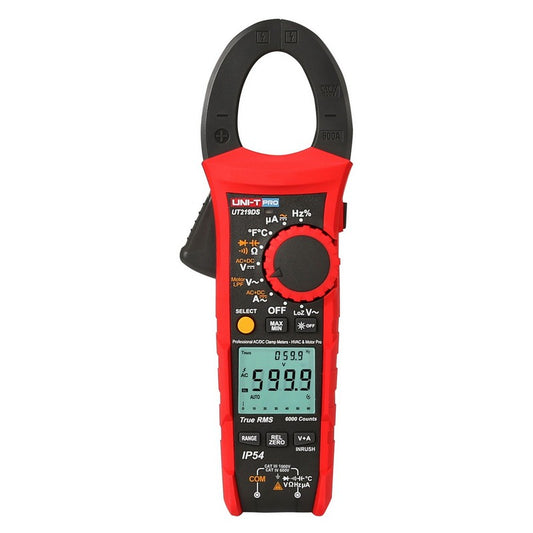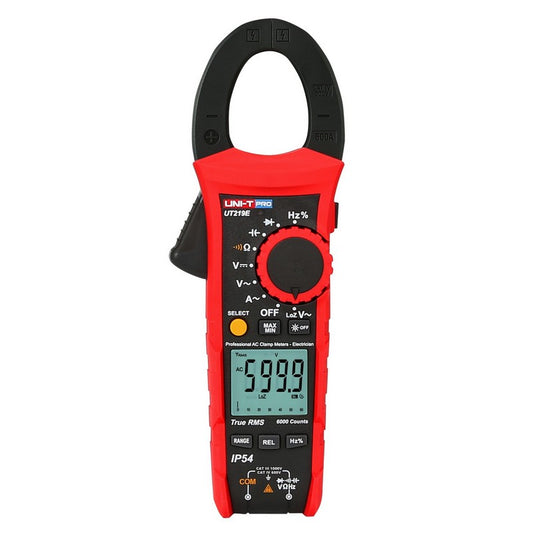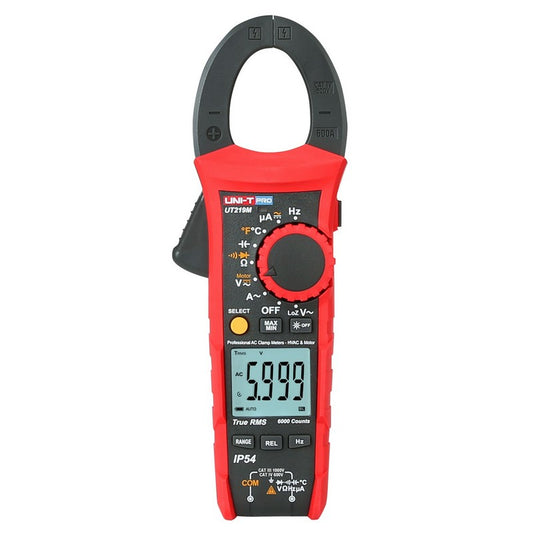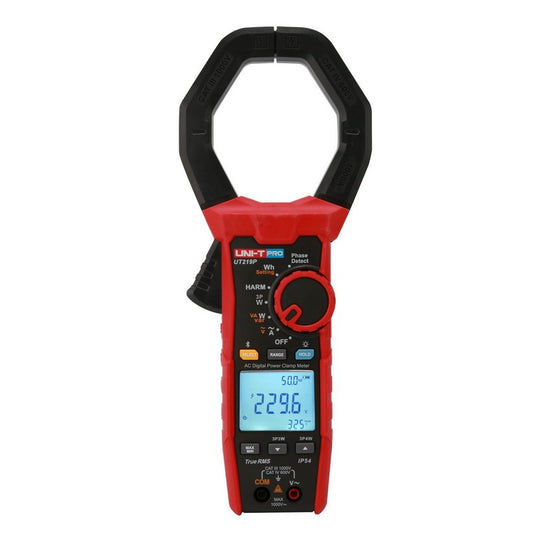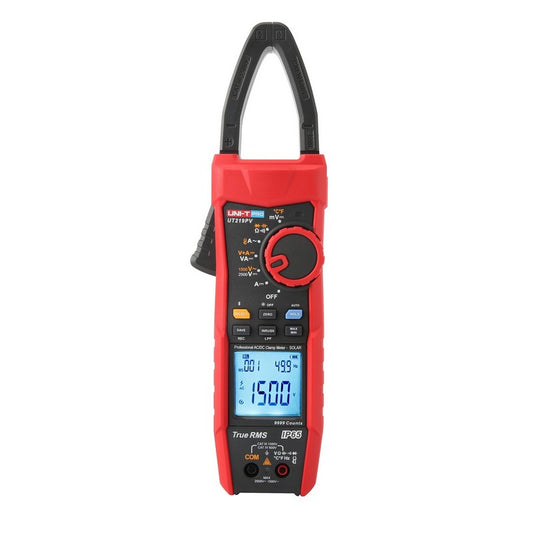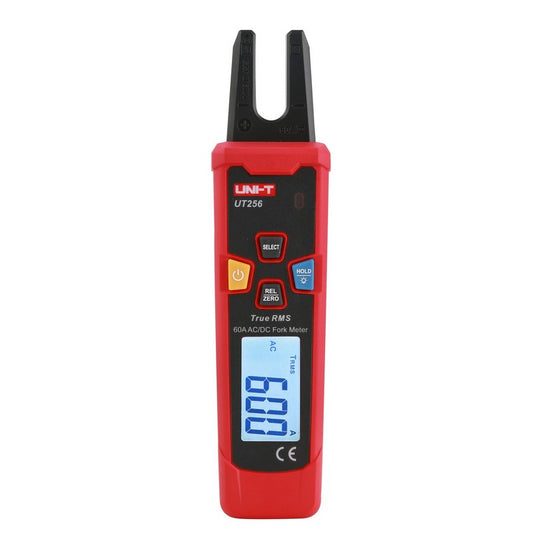Clampmeters
Now's The Time To Save
Save $1,000's on UNI-T Oscilloscopes. Bundles and Discounts until 12/31/25 on MSO2000X, MSO3000X, and MSO7000X. Learn more about the bundles here .
Check out our CLEARANCE Section for unbelievable savings.
Save $1,000's on UNI-T Oscilloscopes. Bundles and Discounts until 12/31/25 on MSO2000X, MSO3000X, and MSO7000X. Learn more about the bundles here .
Check out our CLEARANCE Section for unbelievable savings.
Sort by
Professional Clamp Meter Buying Guide
Understanding Your Measurement Needs
Selecting the right clamp meter is critical for electrical professionals who depend on accurate measurements for safety and efficiency. This guide will help you understand the key features, specifications, and considerations when investing in a professional clamp meter.
Types of Clamp Meters
General-Purpose Clamp Meters
Designed for everyday electrical work, these meters offer essential AC current measurement along with voltage, resistance, and continuity testing. Ideal for residential electricians and general maintenance professionals.
True RMS Clamp Meters
These provide accurate readings on non-linear loads with distorted waveforms (like computers, variable frequency drives, and LED lighting). Essential for modern electrical environments where standard average-responding meters would give inaccurate readings.
AC/DC Clamp Meters
Feature both AC and DC current measurement capabilities, making them versatile for applications involving both power systems and DC electronics. Critical for working with solar installations, battery systems, and automotive applications.
Power Clamp Meters
Specialized for measuring electrical power parameters including watts, power factor, harmonics, and phase sequence. Essential for energy audits, power quality analysis, and industrial motor applications.
Specialized Clamp Meters
Include models designed for specific applications like:
- Solar/PV meters with high DC voltage ranges
- HVAC meters with temperature and capacitance measurement
- Motor testing meters with inrush current and phase rotation features
Key Technical Specifications
Current Measurement Range
- Standard Range: Most professional meters measure up to 600A or 1000A
- Extended Range: Specialized models measure up to 2000A-3000A (often with flexible attachments)
- Low Current Precision: Look for mA ranges for sensitive electronics work
Voltage Measurement
- AC/DC Capability: Consider whether you need both
- Maximum Range: Standard is 600V-1000V; specialized high-voltage models go up to 1500V-2500V
- LoZ Function: Low impedance setting eliminates ghost voltage readings
Jaw Size and Design
- Opening Size: Typically 30-45mm for standard models; larger 50-75mm for industrial applications
- Slim Profile: Thin jaws access tight spaces in panels and enclosures
- Conductor Size Compatibility: Ensure adequate size for your typical applications
Display Features
- Count Resolution: 4000-6000 count displays offer good resolution; 9999 count provides higher precision
- Dual Display: Shows multiple measurements simultaneously
- Backlight: Essential for dimly lit work environments
- Bar Graph: Visualizes changing values faster than digital display
Safety Ratings
- CAT III 600V: Minimum for behind-panel distribution work
- CAT III 1000V/CAT IV 600V: Recommended for industrial and utility applications
- CAT IV 1000V: Highest rating for utility and high-energy industrial environments
Environmental Protection
- IP54: Protected against dust and water splashes
- Drop Testing: Professional models typically offer 1-2 meter drop protection
Advanced Features to Consider
Measurement Capabilities
- True RMS: Essential for accurate readings on non-linear loads
- Inrush Current: Captures motor and transformer startup current spikes
- Peak Hold: Records maximum values for transient events
- Min/Max Recording: Tracks value variations over time
- Data Logging: Records measurements for later analysis
Special Testing Functions
- Phase Rotation: Verifies proper 3-phase sequence for motors
- Harmonics Analysis: Measures power quality issues with harmonic frequencies
- Low Pass Filter: Ensures accurate measurements on variable frequency drives
- Frequency Measurement: Tests system frequency in power applications
- Temperature Measurement: Dual-purpose function for thermal diagnostics
Connectivity Options
- Bluetooth/Wireless: Transfers data to smartphones or tablets
- USB Connection: Interfaces with computers for data analysis
- App Integration: Provides expanded functionality and reporting features
Clamp Meter Terminology
Measurement Terms
- True RMS (Root Mean Square): Accurate measurement method for non-sinusoidal waveforms
- Average Responding: Less expensive measurement method accurate only for pure sine waves
- Jaw: The opening clamp that surrounds conductors for current measurement
- Resolution: The smallest change in measurement the meter can detect
- Sampling Rate: How frequently the meter updates readings (higher is better for dynamic systems)
Safety Terminology
-
CAT Rating: Safety categorization system for transient overvoltage protection
- CAT II: Single-phase receptacle loads
- CAT III: Three-phase distribution, including single-phase commercial lighting
- CAT IV: Three-phase at utility connection, any outdoor conductors
-
IP Rating: Ingress Protection against dust (first digit) and water (second digit)
- IP54: Dust resistant and protected against water splashes
- IP65: Dust tight and protected against water jets
Technical Features
- Auto-Ranging: Automatically selects the optimal measurement range
- LoZ: Low impedance mode that eliminates ghost voltage readings
- Non-Contact Voltage (NCV): Detects voltage presence without contact
- Flexible Current Sensors: Attachments that extend current measurement range
- Bandwidth: Frequency range over which accurate measurements are possible
Application-Specific Considerations
Residential/Commercial Electrical Work
- Focus on AC current up to 600A, voltage, and basic electrical parameters
- True RMS important for modern electronics and lighting systems
- Compact size for working in panels and junction boxes
Industrial Maintenance
- Higher current ranges (1000A+)
- Motor testing capabilities including phase rotation
- Durable construction with superior environmental protection
- Power measurement functions for equipment analysis
HVAC/R Specialists
- Temperature measurement functionality
- Capacitance testing for motor start/run capacitors
- Microamp ranges for flame sensor testing
- Inrush current for compressor startup analysis
Solar/Renewable Energy
- High DC voltage ranges (1500V+)
- DC current capability
- Polarity indication for safe installation
- Power measurement for system efficiency verification
Power Quality Analysis
- Harmonics measurement capability
- Power factor analysis
- Three-phase measurement functionality
- Data logging for long-term monitoring
Making Your Selection
Assess Your Primary Applications
Identify the 80% use case for your meter and ensure it excels in those situations.
Consider Safety Requirements
Never compromise on safety ratings appropriate for your working environment.
Evaluate Durability Needs
Consider your working conditions and select environmental protection accordingly.
Balance Features and Budget
Focus on capabilities that directly enhance your daily productivity rather than rarely used functions.
Research Brand Reliability
Professional-grade instruments should offer reliable operation and proper warranty support.
Maintaining Your Investment
Regular Calibration
Professional meters should be calibrated annually to ensure continued accuracy.
Battery Management
Remove batteries during extended storage to prevent corrosion damage.
Physical Protection
Use protective cases and avoid unnecessary impacts or environmental exposure.
Test Lead Inspection
Regularly examine test leads for damage to insulation or connectors.
Firmware Updates
For connected meters, ensure software/firmware is current for best performance.
Conclusion
A quality clamp meter is an essential investment for electrical professionals. By understanding the different types, key specifications, and your specific application requirements, you can select a meter that will provide years of reliable service and enhance your diagnostic capabilities. Remember that safety, accuracy, and durability should be prioritized over price when selecting professional measurement equipment.


